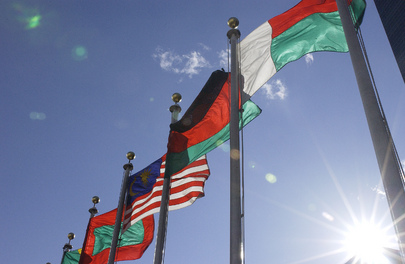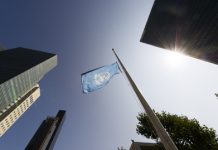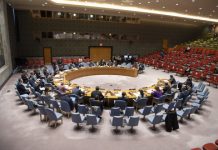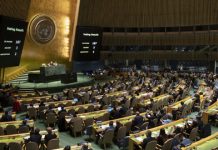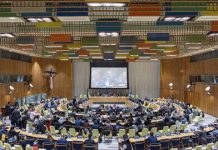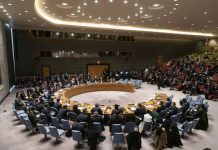Lebanon escalation is worst in 18 years, warns UNICEF
As Lebanon mourns the victims of a wave of Israeli airstrikes believed to have left hundreds dead, UN humanitarians and agencies warned on Tuesday against a return to the “dark days of 2006” when full-scale war broke out.
In Beirut, UNICEF deputy representative in the country, Ettie Higgins, said that the latest escalation was Lebanon’s “worst day in 18 years”.
From the UN human rights office, spokesperson Ravina Shamdasani expressed alarm at the “sharp escalation” of hostilities linked to the war in the Gaza Strip, before calling on all parties to end the violence and ensure the protection of civilians:
“Have we not learned anything from what has been happening in Gaza over the past year? We are extremely concerned about this spillover. This is not normal. This is extremely abnormal when you have people losing their eyes and when you have hospitals not able to cope with the amount of amputations that they need to carry out. We’ve heard all this before, haven’t we? Last year and throughout the past year. This is not normal and this needs to stop.”
Wide-ranging Israeli strikes conducted on Monday in retaliation to attacks by Hezbollah killed at least 492 people, including 35 children and 58 women, according to the Lebanese Ministry of Health. Another 1,645 were also injured across the country where tens of thousands of people have been displaced recently, in addition to the 112,000 uprooted since last October.
Sudan crisis must not be forgotten by world leaders, says UN food agency
Ongoing heavy fighting in Sudan has continued to kill and uproot the country’s people who mustn’t be forgotten by global leaders as they gather in New York on Tuesday, UN humanitarians have said.
In an appeal for greater global solidarity with the people of Sudan, the World Food Programme (WFP) said that around 800,000 people have fled to Adre in neighbouring Chad after enduring “unimaginable violence”.
WFP Communications Officer Leni Kinzli said that those fleeing areas at risk of famine said that they had left “because there was nothing left to eat and all their crops had been destroyed by floods”.
She reported that others said that “they could not even farm because it was too unsafe to go to their fields” because of fighting between the Sudanese Armed Forces and the Rapid Support Forces.
“We are doing everything we can, but we cannot stop widespread starvation and hunger related deaths without the support and attention of the international community. World leaders need to give this humanitarian catastrophe the attention it requires that attention that needs to be translated into concerted diplomatic efforts at the highest levels to push for a humanitarian ceasefire and ultimately, an end to the conflict.”
Since the Adre border crossing from Chad into Sudan reopened a month ago, WFP has transported 2,800 tons of food and nutrition supplies into the Darfur region – guaranteeing enough aid for a quarter of a million people. Of that number, 100,000 are at risk of famine and 36 million people have been pushed into hunger because of the war.
Myanmar military has ‘doubled down on repression’, Human Rights Council hears
To Myanmar, where the military junta that’s fighting a violent civil war has “doubled down on repression”, the UN’s deputy human rights chief has warned.
Speaking at the Human Rights Council in Geneva, Nada Al-Nashif described how Myanmar has become “an abyss of human suffering”, with armed conflict “spreading the length and breadth of the country”.
Ms. Al-Nashif said that a minimum of 5,600 civilians have been killed by the military including 1,160 women and 624 children since generals seized power in February 2021. One in three deaths have been while in military custody, she noted.
The State’s armed forces have been responsible for harming civilians and so too have some ethnic armed groups, albeit at a lesser level, the Deputy High Commissioner added.
She noted that the UN human rights office recently issued another warning about possible new atrocities against the ethnic Rohingya caught between “Arakan Army” separatists – who have forced the Rohingya from their homes – and the military, “leaving them nowhere safe to run”.
And Ms. Al-Nashif said that in Rakhine state, the situation continues to deteriorate, amid intensified clashes that are “killing more civilians, with desperately needed food and medical assistance almost entirely blocked”.
To resolve the crisis, the Deputy High Commissioner urged neighbouring countries with influence to halt the flow of arms into Myanmar; she noted that efforts to hold the country’s military leaders to account were ongoing in the International Criminal Court and other global and national judicial bodies.
Daniel Johnson, UN News
Music composed and produced by Joachim Harris. All rights reserved
Source of original article: United Nations (news.un.org). Photo credit: UN. The content of this article does not necessarily reflect the views or opinion of Global Diaspora News (www.globaldiasporanews.com).
To submit your press release: (https://www.globaldiasporanews.com/pr).
To advertise on Global Diaspora News: (www.globaldiasporanews.com/ads).
Sign up to Global Diaspora News newsletter (https://www.globaldiasporanews.com/newsletter/) to start receiving updates and opportunities directly in your email inbox for free.


